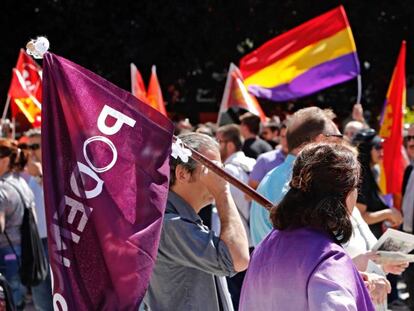Unidos Podemos leaves Socialists behind, takes second place in polls
The Popular Party emerges as leader in latest survey thanks to likely abstention of voters at June 26 elections

The general elections in Spain on June 26 are likely to see a battle between extremes, and the Socialist Party (PSOE), which will be stuck in the middle, could be the loser if it fails to capture the hearts and minds of an indecisive electorate that, right now, sees little reasons to head to the polls. The Unidos Podemos coalition between anti-austerity group Podemos and the communist-led United Left (IU) has pursued the same strategy as the conservative Popular Party (PP) in seeking to polarize voters during the campaign and ignore the Socialists. These factors, along with voter turnout that could be five points lower than at the inconclusive December elections, has given the PP first place in the latest Metroscopia opinion poll for EL PAÍS, with Unidos Podemos second and the PSOE in a distant third.

Acting Prime Minister Mariano Rajoy has stood firm over the last six months, maintaining the PP’s lead in the polls. If elections were held today, he would take 28.5% of the vote, just 1.5% off the margin his party’s strategists need. What’s more, PP voters are traditionally loyal (78% of them say they will be supporting Rajoy in three weeks time).
The PP and Unidos Podemos know that voters have short memories, and they can each count on a loyal and motivated constituency
At the other end of the political spectrum, Unidos Podemos is in a similar position. Despite public perceptions that Podemos has blocked efforts to form a government, supporters of the coalition led by Pablo Iglesias and Alberto Garzón have rallied (78% say they will repeat their vote on June 26), giving it a 25.6% share of the vote according to Sunday’s Metroscopia poll (5.4% ahead of the PSOE).
The PP and Unidos Podemos know that voters have short memories and that despite their failure to reach consensus and form a government over the last six months, they can each count on a loyal and motivated constituency. Deputy Prime Minister Soraya Sáenz de Santamaría has effectively admitted that she prefers Iglesias as a rival, finding it easier to explain to voters the dangers she sees a Podemos government posing for Spain, while Rajoy has openly questioned whether his main rival is Socialist leader Pedro Sánchez. In turn, Unidos Podemos has successfully established itself as the only alternative to a third consecutive PP government, with Iglesias calling on “the old social democrats” that traditionally have supported the PSOE to decide who they are going to support on June 26.
The PSOE finds itself in its most difficult position since Spain returned to democracy four decades ago
The PSOE finds itself in its most difficult position since Spain returned to democracy four decades ago. The possibility of losing its position as the voice of the left in Spain is very real as it finds itself sandwiched between two powerful rivals. What was once its strength: occupying the center-left ground where the majority of Spanish voters are to be found, has now become its weakness in an increasingly polarized fight. The Metroscopia poll gives the Socialists 20.2% of the vote, almost two points down from its result in December, putting it in a distant third place after the PP and Unidos Podemos: on the morning of June 27, it would still have a role to play in the formation of any government, but would not be in a position to take the initiative.
English version by Nick Lyne.
Sign up to our newsletter
EL PAÍS English Edition has launched a weekly newsletter. Sign up today to receive a selection of our best stories in your inbox every Saturday morning. For full details about how to subscribe, click here.
Tu suscripción se está usando en otro dispositivo
¿Quieres añadir otro usuario a tu suscripción?
Si continúas leyendo en este dispositivo, no se podrá leer en el otro.
FlechaTu suscripción se está usando en otro dispositivo y solo puedes acceder a EL PAÍS desde un dispositivo a la vez.
Si quieres compartir tu cuenta, cambia tu suscripción a la modalidad Premium, así podrás añadir otro usuario. Cada uno accederá con su propia cuenta de email, lo que os permitirá personalizar vuestra experiencia en EL PAÍS.
En el caso de no saber quién está usando tu cuenta, te recomendamos cambiar tu contraseña aquí.
Si decides continuar compartiendo tu cuenta, este mensaje se mostrará en tu dispositivo y en el de la otra persona que está usando tu cuenta de forma indefinida, afectando a tu experiencia de lectura. Puedes consultar aquí los términos y condiciones de la suscripción digital.









































